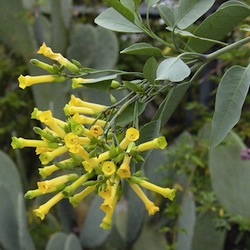 Could biofuels be produced from the tobacco tree? With a grant from the European Union, researchers at Royal Holloway, School of Biological Sciences, will test this theory based on initial findings that the Nicotiana Glauca produces compounds that could be used to produce biodiesel or cracked to produce petroleum products.
Could biofuels be produced from the tobacco tree? With a grant from the European Union, researchers at Royal Holloway, School of Biological Sciences, will test this theory based on initial findings that the Nicotiana Glauca produces compounds that could be used to produce biodiesel or cracked to produce petroleum products.
There are some advantages of the tobacco tree: it is known to grow well in warm and arid climates; it does not require fertile ground; and it can thrive in regions that only 200mm of rainfall a year, with temperatures exceeding 40 degrees Celsius.
“This is a crucial factor,” said Dr Paul Fraser from the School of Biological Sciences. “It means that growing this crop will not be in competition for land space with food crops. Indeed, many farmers have already raised concerns about giving their land over to biofuel crops. Our discovery could potentially solve this issue.”
Initial studies have shown that the plant is able to grow in desert climatic conditions, such as those found in the United Arab Emirates, North Africa and other arid tropical regions of the world.
The European Union has awarded funding to develop this work further through the MultiBioPro project. Together with partners in industry and academia Royal Holloway has received a research grant totalling 5,770,922 euros (approximately £4.4 million). The project will look to provide new insights into biological processes and improve the use of renewable energy resources.

